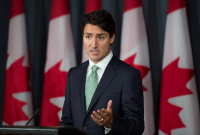Support strong Canadian climate journalism for 2025
The International Monetary Fund says uncertainty surrounding the incoming Donald Trump administration in the United States is making it difficult to forecast how the global economy will perform this year.
But the Washington−based IMF says it estimates the Canadian economy will grow by 1.9 per cent in 2017 and 2 per cent in 2018. That compares with its previous estimate of 1.9 per cent growth in both years.
Canada is expected to have the second−fastest growth among the G7, ahead of the four European members and Japan.
The IMF estimates the United States will lead the G7, with its economy expanding by 2.3 per cent this year and 2.5 per cent next year — up from previous estimates of 2.2 per cent in 2017 and 2.1 per cent in 2018.
Its latest outlook for advanced economies as a whole has improved for the 2017−18 period, compared with its October estimates, due to somewhat stronger activity in the second half of 2016 and projected U.S. government stimulus.
But the IMF’s estimates for several large developing economies has been revised lower — notably India, Brazil and Mexico.
It estimates Mexico’s economy will grow about 1.7 per cent in 2017 and 2.0 per cent in 2018 — down 0.6 of a percentage point in each year from its October outlook.
Mexico has been a frequent target of comments by President−elect Donald Trump, who has promised before and since the November election that the United States will build a wall between the two countries.
Trump has also said he will scrap the North American Free Trade Agreement — signed by Canada, the United States and Mexico — and focus on ways to keep jobs in the United States.
In an interview with German daily Bild and The Times of London, published on Sunday, Trump said German car manufacturer BMW could face tariffs of up to 35 per cent if they set up plants in Mexico instead of the United States.
BMW said Monday that the company would stick to its plans to produce cars in Mexico.
Earlier this month, Trump threatened on Twitter to slap a border tax on General Motors for importing the compact Chevrolet Cruze to the United States from Mexico. GM responded that it only imports a small number of Cruze hatchbacks and makes all of its Cruze sedans near Cleveland, Ohio.
On Friday, Trump spokesman Sean Spicer told reporters on a conference call that a U.S. border tax on imported autos would not be applied to any one country and could impact Canada, according to a Bloomberg News report.





Comments
Hgh For Sale In Mexico
Whether you want to look in shops or totally on-line, you will have a world of desirable sections available to you. Wedding event rings, pendant pendants, and tennis games charms, are only a number of the great forms of expensive jewelry that one could pick from. These details can certainly make buying jewellery a breeze.The Precious jewelry Container: Your Go-To Jewellery Manual
Igf 1 Valori Alti
You must educate your pet precisely what is appropriate and what exactly is incorrect. This simply means setting business guidelines for all to follow along with regarding your dog. It may quickly make your endeavours backfire!
growth hormone test
Should you suffer from men routine baldness or have hairless regions, you will probably find assist with locks weaving. A fine mesh can be attached to remaining head of hair after which true or man-made head of hair is woven in to the fine mesh. These give a momentary remedy, as the fine mesh can oxidize, stretch or loosen. Then they must be changed.
human growth hormone injections brands